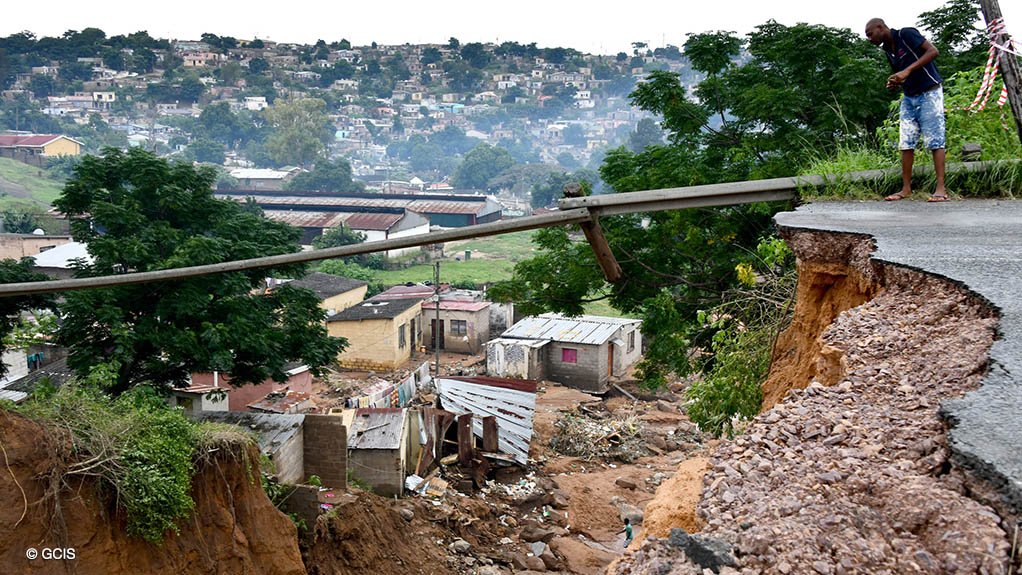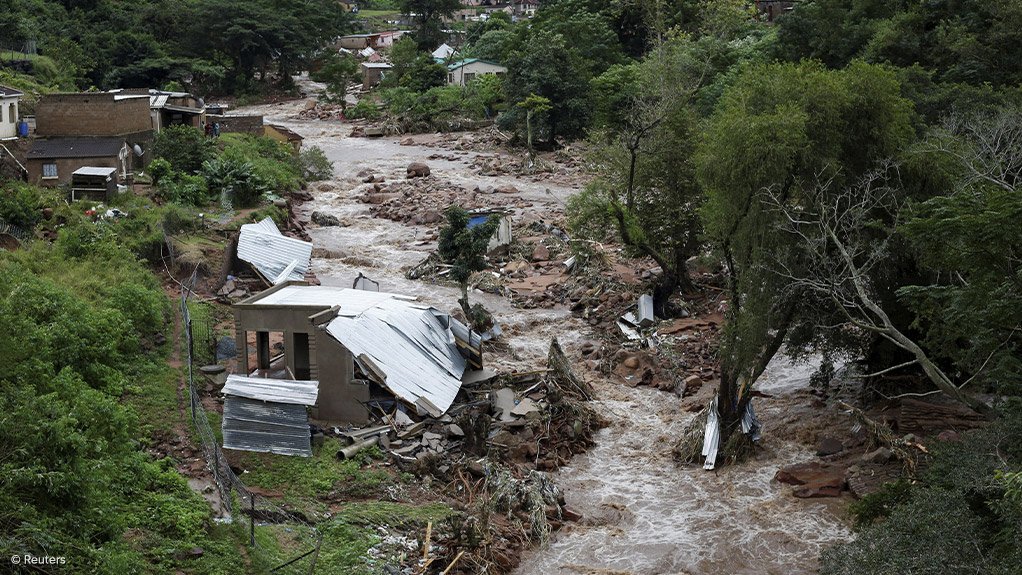New infrastructure vulnerable to climate change owing to mismanagement, corruption
New infrastructure is just as vulnerable to climate change as ageing infrastructure, South African Local Government Association (Salga) senior climate change adviser Slindile Maphumulo said on May 10.
She explained that, while ageing infrastructure was vulnerable to being damaged or destroyed during extreme weather events, new infrastructure was equally at risk as a result of being built poorly, slowly or not at all owing to poor tender systems, the appointment of incompetent service providers and contractors, black economic empowerment systems, inexperienced engineers and, most of all, rampant corruption.
Maphumulo was speaking at a webinar titled ‘The impact of climate change and changing weather patterns on society’, hosted by the Government Communication and Information System in partnership with Salga and the Department of Forestry, Fisheries and the Environment.
She said these factors, along with several others, meant that municipalities and local communities across the country were not prepared for the impending impacts of extreme weather events caused by climate change on their infrastructure.
Maphumulo said this unpreparedness was made evident by the floods in KwaZulu-Natal during April, which claimed the lives of more than 400 people and caused about R17-billion worth of property damage, from roads, to pipelines, to railway tracks, to homes and buildings.
“Heavy rain and floods bring stress to existing physical infrastructure such as bridges, roads, ports, electrical grids, broadband Internet, transportation and communication systems,” she said, noting that the recent floods showed that climate change had already impacted the economy by shutting down highways, logistics routes and putting a large number of businesses in jeopardy.
PREVENTION IS BETTER THAN CURE
Maphumulo said municipalities could contribute to the fight against climate change by employing climate change mitigation strategies, such as retrofitting buildings to make them more energy efficient; adopting renewable energy sources such as solar, wind and small hydro; helping cities develop more sustainable transport such as bus rapid transit (BRT), electric vehicles and biofuels; and promoting more sustainable uses of land and forests.
She said municipalities were expected to be capable of doing this, owing to the numerous, costly feasibility studies, study tours and related activities undertaken by various municipalities to assess their ability to contribute towards preventing climate change.
“However, despite efforts to transition already being made by some metros and secondary cities, we still have a long way to go. We haven’t done quite enough,” Maphumulo said.
She said that, while some municipalities had invested in efficient street lighting, green buildings, solar energy in human settlements, and BRT systems, for example, there was an urgent need to engage in larger-scale investment into things such as waste-to-energy technology and electric vehicle infrastructure.
Maphumulo said local municipalities still adopted traditional methods of town planning with a lack of appreciation for climate change.
“We have found that, in municipalities, town planners do not necessarily consult with climate or environmental specialists to ensure that, when they plan, environmental issues are taken into consideration,” she said.
She added that part of the problem was also that many of the 2 600 informal settlements in the country continued to appear in wetlands and in flood lands.
“There's not much that we are doing as government to prevent that. Government even continues to provide basic service to those settlements that are at risk,” Maphumulo said.
She said municipalities and every other stakeholders should be working towards better, more transparent building practices that incorporated energy efficiency and renewable energy technologies so that they might contribute towards transforming the grid to be less dependent on fossil fuels.
“We should be using renewable energy sources, converting waste to energy, and recycling instead of pollution and filling landfill sites. Moreover, we should promote greener transport and make non-motorised transport fashionable, such as bicycles, trains and walking,” Maphumulo said, adding that making cities more walkable would contribute significantly to reducing emissions.
She also believed that municipalities should invest in the expansion of green spaces by promoting the planting of trees in cities and integrating more parks and recreation facilities into residential living areas.
Importantly, Maphumulo emphasized that municipalities and local governments should work to stop the building of houses in environmentally sensitive areas and fight illegal land occupation.
It was also important to combat illegal immigration and to stop the infiltration of foreign nationals into South African cities, towns and economic areas, she added.
“Going forward, it is important for municipalities to invest in resilient infrastructure that will be able to withstand future climate risks. Therefore, climate resilient education is vitally important for city planners, emergency managers, educators, communicators, and all other community members to prepare for climate change,” Maphumulo said.
Article Enquiry
Email Article
Save Article
Feedback
To advertise email advertising@creamermedia.co.za or click here
Press Office
Announcements
What's On
Subscribe to improve your user experience...
Option 1 (equivalent of R125 a month):
Receive a weekly copy of Creamer Media's Engineering News & Mining Weekly magazine
(print copy for those in South Africa and e-magazine for those outside of South Africa)
Receive daily email newsletters
Access to full search results
Access archive of magazine back copies
Access to Projects in Progress
Access to ONE Research Report of your choice in PDF format
Option 2 (equivalent of R375 a month):
All benefits from Option 1
PLUS
Access to Creamer Media's Research Channel Africa for ALL Research Reports, in PDF format, on various industrial and mining sectors
including Electricity; Water; Energy Transition; Hydrogen; Roads, Rail and Ports; Coal; Gold; Platinum; Battery Metals; etc.
Already a subscriber?
Forgotten your password?
Receive weekly copy of Creamer Media's Engineering News & Mining Weekly magazine (print copy for those in South Africa and e-magazine for those outside of South Africa)
➕
Recieve daily email newsletters
➕
Access to full search results
➕
Access archive of magazine back copies
➕
Access to Projects in Progress
➕
Access to ONE Research Report of your choice in PDF format
RESEARCH CHANNEL AFRICA
R4500 (equivalent of R375 a month)
SUBSCRIBEAll benefits from Option 1
➕
Access to Creamer Media's Research Channel Africa for ALL Research Reports on various industrial and mining sectors, in PDF format, including on:
Electricity
➕
Water
➕
Energy Transition
➕
Hydrogen
➕
Roads, Rail and Ports
➕
Coal
➕
Gold
➕
Platinum
➕
Battery Metals
➕
etc.
Receive all benefits from Option 1 or Option 2 delivered to numerous people at your company
➕
Multiple User names and Passwords for simultaneous log-ins
➕
Intranet integration access to all in your organisation























